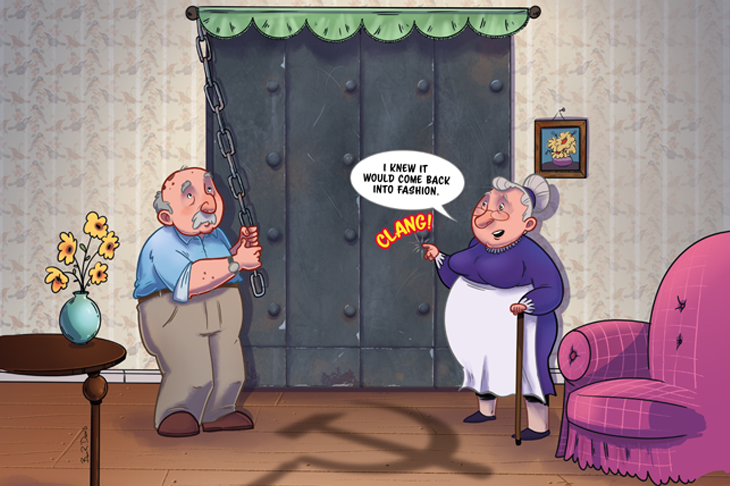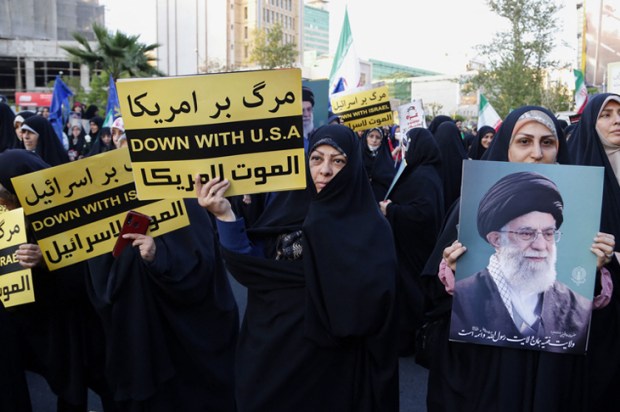The Ukrainian crisis is a wake-up call for the woke. For decades, the West’s cosseted elite lived like Peter Pan, the boy who wouldn’t grow up. They didn’t want to make policy as if ‘solemn things’ like economics, energy, or defence were real. They spent their lives flitting between UN conferences in Neverland pretending anything was possible if only enough people believed in climate change.
Russia was all but invisible at the UN climate fest in Glasgow last year but that didn’t stop John Kerry, Biden’s climate envoy saying, as tanks rolled into Ukraine, that he hoped Putin would still help the West ‘stay on track with what we need to do for the climate’. ‘I thought we lived in a world that had said no to that kind of activity,’ he said disbelievingly, as if Tinker Bell might still come to the rescue. ‘Hopefully President Putin would realise that in the northern part of his country… it’s thawing, and his infrastructure is at risk,’ he continued, seemingly unaware that Putin is spending nearly a billion dollars putting a fibre optic cable across the Arctic, expanding Arctic oil and gas drilling and putting in new military marine bases and patrol vessels.
While Trump was President, the US achieved energy independence for the first time since 1957 because he approved projects stymied by Obama and eliminated red and green tape. This cut energy costs in the US and globally, strengthening the world economy and weakening the West’s enemies.
Yet under Biden, US policies have benefited Putin and other energy despots. On his first three days in office, Biden revoked permits for the construction of the Keystone XL pipeline which would have delivered Canadian and US crude oil to refineries on the Gulf coast, halted new oil and gas leases on federal lands and waters and suspended oil and gas leases in the Arctic and New Mexico. Yet while he closed projects at home, Biden waived sanctions Trump had imposed on the Nord Stream 2 gas pipeline between Russia and Germany. Secretary of State Antony Blinken said the President wanted, ‘a predictable, stable relationship with Russia’ and Germany welcomed the move, but Democrat senator Bob Menendez, chair of the Senate Foreign Relations Committee said he failed to see how the decision would ‘advance US efforts to counter Russian aggression in Europe’ and Yuriy Vitrenko, CEO of Ukrainian energy company Naftogaz, said Nord Stream was Russia’s most ‘dangerous geopolitical project’. Thanks to Biden, Russia doubled its oil sales to the US, displacing Mexico as the second-largest foreign supplier and the US also increased purchases from OPEC and Venezuela.
In 2019, Trump backed the EastMed pipeline to supply Israeli gas to Greece, Cyprus, Italy, Bulgaria, Hungary, North Macedonia, Romania and Serbia, meeting up to ten per cent of Europe’s needs. But in January, the Biden administration reversed the decision citing environmental concerns, economic viability and saying the pipeline would have a destabilising impact on the region. Doing so dudded US allies but delighted Turkey, which wants the pipeline to run through its territory precisely so that it can turn off the gas at will. Western Europe’s climate and energy policies are equally deluded, formulated with eyes wide shut to emissions generated beyond its borders. Europe gets over 40 per cent of its natural gas from the Russians even though they are prone to reducing supply during the winter, forcing up prices. Most of Europe has shale gas, yet it is largely undeveloped because of environmental protests and the UK has failed to expand oil and gas extraction in the North Sea because of its self-proclaimed status as a ‘climate leader’.
The situation was set to get even worse, with Germany planning to phase out its coal-fired power plants by 2030 and shut down all its nuclear power plants by the end of this year. France had also pledged to reduce its reliance on nuclear power which generates 70 per cent of its power. Yet as tensions rose between the Ukraine and Russia and prices skyrocketed, utopian climate commitments fractured. Coal imports to the EU rose by more than 56 per cent in January, and Britain gave a Welsh coal mine permission to increase output by 40 million tons over 20 years.
This month, the invasion of Ukraine finally forced Western Europe to grow up. German Chancellor Olaf Scholz said events had shown that energy policy is decisive not just for the economy and the environment but for security. Who’d have thought it? Germany is halting, for now, the Nord Stream 2 pipeline, will build two liquefied natural gas terminals, increase storage facilities and may extend the life of its coal and nuclear plants. It will also increase military spending to more than two per cent of GDP, a request repeatedly made by the US, most forcefully by Trump, and until now ignored. President Macron has said the time has come for a ‘nuclear renaissance’, and France will construct up to fourteen new-generation reactors and a fleet of smaller nuclear plants. The UK’s Committee on Climate Change says it will not object to new licences for oil and gas exploration in the North Sea.
So far, PM Morrison’s policy response has been to ban Putin from travelling to Australia. Yet the sea-change in Europe presents his government with the opportunity to address its own national security and energy security dilemmas. In the threatening environment it faces, Australia must strengthen its capacity to ensure sea lanes stay open. It cannot wait decades to build nuclear-powered submarines, it needs to buy them now and develop the capacity to maintain them. It also needs to rapidly increase its onshore fuel storage and refining capacity and it cannot allow coal-fired power stations to shut down early. If the owners do not want to operate them, they must be required to sell them and activists cannot be allowed to block finance on spurious climate change grounds. If these policies differentiate the government from Labor, so much the better. In the face of the dangers posed by a declining superpower in Russia and a rising one in China, working together, Australia cannot afford the luxury of Peter Pan policies. Or else it’s curtains.
Got something to add? Join the discussion and comment below.
Get 10 issues for just $10
Subscribe to The Spectator Australia today for the next 10 magazine issues, plus full online access, for just $10.
You might disagree with half of it, but you’ll enjoy reading all of it. Try your first month for free, then just $2 a week for the remainder of your first year.














Comments
Don't miss out
Join the conversation with other Spectator Australia readers. Subscribe to leave a comment.
SUBSCRIBEAlready a subscriber? Log in